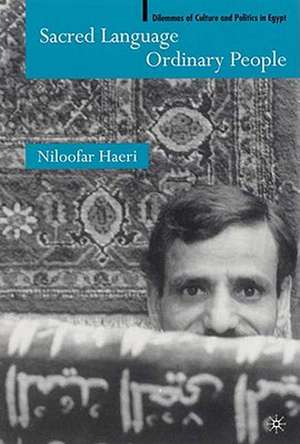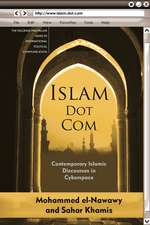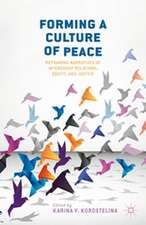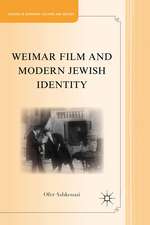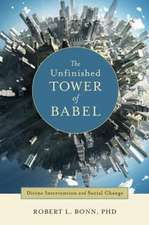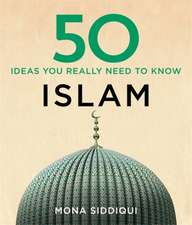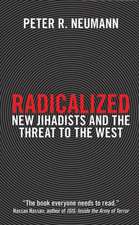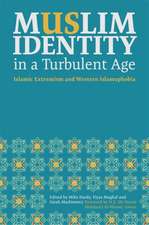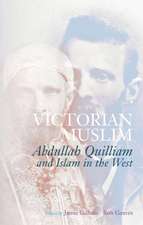Sacred Language, Ordinary People: Dilemmas of Culture and Politics in Egypt
Autor N. Haerien Limba Engleză Paperback – 24 feb 2003
| Toate formatele și edițiile | Preț | Express |
|---|---|---|
| Paperback (1) | 381.98 lei 6-8 săpt. | |
| Palgrave Macmillan US – 24 feb 2003 | 381.98 lei 6-8 săpt. | |
| Hardback (1) | 384.48 lei 6-8 săpt. | |
| Palgrave Macmillan US – 24 feb 2003 | 384.48 lei 6-8 săpt. |
Preț: 381.98 lei
Nou
Puncte Express: 573
Preț estimativ în valută:
73.10€ • 76.04$ • 60.35£
73.10€ • 76.04$ • 60.35£
Carte tipărită la comandă
Livrare economică 14-28 aprilie
Preluare comenzi: 021 569.72.76
Specificații
ISBN-13: 9780312238971
ISBN-10: 0312238975
Pagini: 208
Ilustrații: XVI, 184 p.
Dimensiuni: 140 x 216 x 18 mm
Greutate: 0.27 kg
Ediția:2003
Editura: Palgrave Macmillan US
Colecția Palgrave Macmillan
Locul publicării:New York, United States
ISBN-10: 0312238975
Pagini: 208
Ilustrații: XVI, 184 p.
Dimensiuni: 140 x 216 x 18 mm
Greutate: 0.27 kg
Ediția:2003
Editura: Palgrave Macmillan US
Colecția Palgrave Macmillan
Locul publicării:New York, United States
Cuprins
Introduction Humble Custodians of the Divine Word: Classical Arabic in Daily Life Text Regulation and Site Ideology Creating Contemporaneity: Struggles with Form Persistent Dilemmas: Pleasure, Power, and Ambiguity Conclusion
Recenzii
'[T]his is one of the most interesting books I have ever read on language. It is certainly unique insofar as the study of Arabic is concerned, for no linguistic ethnography exists for Classical Arabic'. - Steven C. Caton, Professor of Contemporary Arab Studies, Harvard University
'I don't know of anyone who has carved out the subject Haeri is pursuing in such original fashion. She writes clearly about a very complicated set of issues, and she has a wonderful way of blending theory with empirical work'. - Philip S. Khoury, Professor of History, Massachusetts Institute of Technology
'Haeri's fine book explores one of the most fundamental distinctions in human communication systems-formal versus informal-by examining one of the world's most important official languages-Classical Arabic. She shows that understanding the role of formal language in society is crucial to an understanding of the state and its relation to symbolic capital. This subtle and well-written analysis is only possible because Haeri relies on concrete ethnographic data of language in practice for her examples'. - Joel Kuipers, George Washington University, Institute for Ethnographic Research
'I don't know of anyone who has carved out the subject Haeri is pursuing in such original fashion. She writes clearly about a very complicated set of issues, and she has a wonderful way of blending theory with empirical work'. - Philip S. Khoury, Professor of History, Massachusetts Institute of Technology
'Haeri's fine book explores one of the most fundamental distinctions in human communication systems-formal versus informal-by examining one of the world's most important official languages-Classical Arabic. She shows that understanding the role of formal language in society is crucial to an understanding of the state and its relation to symbolic capital. This subtle and well-written analysis is only possible because Haeri relies on concrete ethnographic data of language in practice for her examples'. - Joel Kuipers, George Washington University, Institute for Ethnographic Research
Notă biografică
NILOOFAR HAERI is Professor of Anthropology at Johns Hopkins University. She was a Bunting Fellow at the Radcliffe Institute for Advanced Study at Harvard University (1999-2000) and is an internationally recognized scholar of Arabic. She has conducted research on language change and its relation to class and gender in Egypt. Among her publications are The Sociolinguistic Market of Cairo: Gender, Class, and Education (Kegan Paul International, 1996) and Structuralist Studies in Arabic Linguistics: Papers Published by Charles Ferguson 1948-1992, with K. Belnap (E. J. Brill, 1997).
